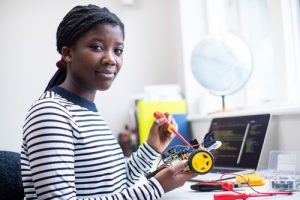
Bipartisan legislation proposed by U.S. Sen. Shelley Moore Capito (R-WV) would increase hands-on learning opportunities in science, technology, engineering and math (STEM) education outside of the classroom to address America’s STEM workforce shortages.
“In order for the United States to have a next-generation workforce, we must invest in students early,” Sen. Capito said on Wednesday. “Increasing opportunities for young students to engage in STEM education, especially hands-on experiences, will prepare them for the 21st Century economy.”
Sen. Capito is the original cosponsor of the Supporting STEM Learning Opportunities Act, S. 1565, which she introduced on May 11 with bill sponsor U.S. Sen. Jeanne Shaheen (D-NH), to authorize investments in experiential learning opportunities that could bolster America’s pipeline of students entering the STEM workforce, especially women and people of color, according to Sen. Capito’s staff.
The United States educational system currently is not producing a sufficient number of workers with the necessary STEM expertise to meet the nation’s needs in STEM fields, according to the text of S. 1565. The bill notes that “hands-on and experiential learning opportunities outside of the classroom are critical for student success in STEM subjects and careers, stimulating students’ interest, increasing confidence, and creating motivation to pursue a related career.”
If enacted, the bill would task the director of the National Science Foundation — subject to the availability of appropriations — to provide grants to eligible nonprofit programs for supporting hands-on learning opportunities in STEM education, including after-school activities and innovative learning opportunities such as robotics competitions, the bill’s text says.
Priority for grant funds would be given to eligible nonprofit programs serving students who attend elementary, secondary and high schools that are implementing comprehensive support and improvement activities or targeted support and improvement activities, or that serve high percentages of students who are eligible for a free or reduced price lunch, according to language in the bill.
The legislation has been referred for consideration to the U.S. Senate Health, Education, Labor, and Pensions Committee.



